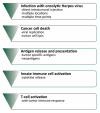HSV-1 Oncolytic Viruses from Bench to Bedside: An Overview of Current Clinical Trials
- PMID: 33255871
- PMCID: PMC7760226
- DOI: 10.3390/cancers12123514
HSV-1 Oncolytic Viruses from Bench to Bedside: An Overview of Current Clinical Trials
Abstract
Herpes simplex virus 1 (HSV-1) provides a genetic chassis for several oncolytic viruses (OVs) currently in clinical trials. Oncolytic HSV1 (oHSV) have been engineered to reduce neurovirulence and enhance anti-tumor lytic activity and immunogenicity to make them attractive candidates in a range of oncology indications. Successful clinical data resulted in the FDA-approval of the oHSV talimogene laherparepvec (T-Vec) in 2015, and several other variants are currently undergoing clinical assessment and may expand the landscape of future oncologic therapy options. This review offers a detailed overview of the latest results from clinical trials as well as an outlook on newly developed HSV-1 oncolytic variants with improved tumor selectivity, replication, and immunostimulatory capacity and related clinical studies.
Keywords: HSV-1; clinical trials; immunotherapy; oncolytic virus.
Conflict of interest statement
E.A.C. is currently an advisor to Advantagene Inc., Insightec, Inc., Seneca Therapeutics, Immunomic Therapeutics and DNAtrix Inc. and has equity interest in Immunomic Therapeutics, Seneca Therapeutics and DNAtrix; he has also advised Alcyone Biosciences, Voyager Therapeutics, Sangamo Therapeutics, Oncorus, Merck, Tocagen, Ziopharm, Stemgen, NanoTx., Ziopharm Oncology, Cerebral Therapeutics, Genenta. Merck, Janssen, Karcinolysis, Shanaghai Biotech, Sigilon Therapeutics. He has received research support from NIH, US Department of Defense, American Brain Tumor Association, National Brain Tumor Society, Alliance for Cancer Gene Therapy, Neurosurgical Research Education Foundation, Advantagene, NewLink Genetics and Amgen. He also is a named inventor on patents related to oncolytic HSV1.
Figures
References
-
- Phan G.Q., Yang J.C., Sherry R.M., Hwu P., Topalian S.L., Schwartzentruber D.J., Restifo N.P., Haworth L.R., Seipp C.A., Freezer L.J., et al. Cancer regression and autoimmunity induced by cytotoxic T lymphocyte-associated antigen 4 blockade in patients with metastatic melanoma. Proc. Natl. Acad. Sci. USA. 2003;100:8372–8377. doi: 10.1073/pnas.1533209100. - DOI - PMC - PubMed
-
- Topalian S.L., Hodi F.S., Brahmer J.R., Gettinger S.N., Smith D.C., McDermott D.F., Powderly J.D., Carvajal R.D., Sosman J.A., Atkins M.B., et al. Safety, activity, and immune correlates of anti-PD-1 antibody in cancer. N. Engl. J. Med. 2012;366:2443–2454. doi: 10.1056/NEJMoa1200690. - DOI - PMC - PubMed
-
- Ali S.A., Shi V., Maric I., Wang M., Stroncek D.F., Rose J.J., Brudno J.N., Stetler-Stevenson M., Feldman S.A., Hansen B.G., et al. T cells expressing an anti-B-cell maturation antigen chimeric antigen receptor cause remissions of multiple myeloma. Blood. 2016;128:1688–1700. doi: 10.1182/blood-2016-04-711903. - DOI - PMC - PubMed
Publication types
Grants and funding
LinkOut - more resources
Full Text Sources


